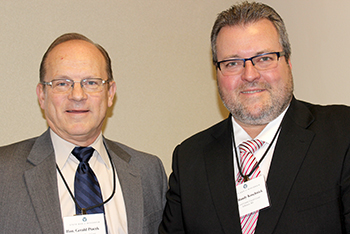
Racine County Circuit Court Judge Gerald Ptacek (left) and Jefferson County Circuit Court Judge Randy Koschnick appeared to urge board support for petitions that would make e-filing of court documents mandatory in Wisconsin and require redaction of certain "protected information" from documents filed with the court.
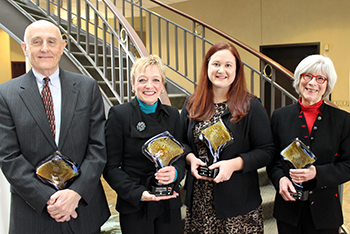
Top Wisconsin Legal Innovators received awards at the board meeting. From left: Mike Gonring, Anne Smith, Beth Ann Richlen, and the Hon. Karen Christenson. 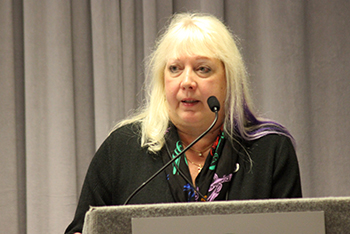
Kathryn Bullon, chair of the State Bar's CLE Committee, said the CLE Committee opposes a current proposal to allow CLE credit for pro bono work.
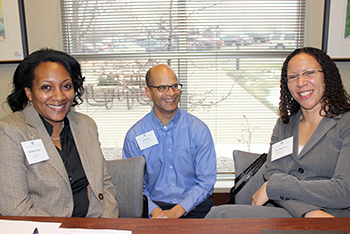
From left, Brookfield attorney Athenee Lucas, State Bar Pro Bono Coordinator Jeff Brown, and Eve Runyon, director of the corporate pro bono project at the Pro Bono Institute in Washington D.C., talk pro bono at the board meeting.
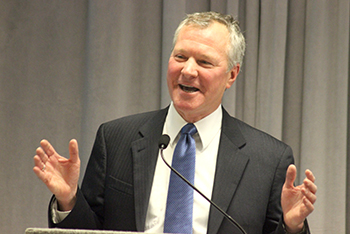
State Bar President Robert Gagan said "don't wear a suit" when meeting with local bar leaders up north during or around deer hunting season.
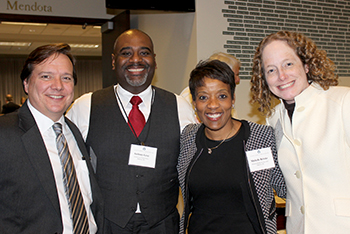
From left, Dist. 9 Gov. Christopher Rogers, Dist. 9 Gov. Anthony Gray, former State Bar President Michelle Behnke, and State Bar Secretary Sherry Coley.
Dec. 5, 2014 – Mandatory e-filing and a proposed rule requiring redaction of certain “protected information” in court documents were among the discussion topics at the State Bar of Wisconsin Board of Governors' meeting today in Madison.
Jefferson County Circuit Court Judge Randy Koschnick, representing the Committee of Chief Judges, urged State Bar support for the mandatory e-filing petition, which was submitted to the Wisconsin Supreme Court in October and is scheduled for a public hearing in March. Koschnick served on a subcommittee that studied mandatory e-filing.
E-filing has been voluntary since 2008, but only 24 counties participate and less than 1 percent of all cases filed between 2009 and 2013 were filed electronically.
Koschnick says voluntary e-filing has not achieved the efficiencies envisioned by that system, and going mandatory will allow the courts to realize those efficiencies.
The proposal mandates e-filing in all cases, with a three-year, county-by-county roll-out plan starting in 2016. All counties would be mandatory by the end of 2018.
“Basically, the chief judges believe that e-filing is inevitable, and we think it’s advisable to be methodical and forward-thinking about implementing it,” Koschnick told the board, which is expected to decide whether to support the petition at its next meeting in February. “The worst possible world is half e-filing, half paper.”
The filing fee would be between $5 and $6 per case. The fee would be waived for cases involving indigent clients, as well as cases appointed to public defenders.
Cases brought on behalf of government agencies are exempt. In addition, private attorneys who take public defender appointments would be exempt from the fee.
Board Hears Proposal on Redaction of Court Filings
Racine County Circuit Court Judge Gerald Ptacek appeared on behalf of the CCAP Steering Committee to urge support for a petition, filed in November and requiring parties to redact “protected information” from court documents before filing.
Such information includes Social Security and passport numbers, driver license numbers, and financial and banking information. At least 20 states and the federal courts have similar rules on redaction and confidentiality, a supporting memo states.
The CCAP Steering Committee filed the petition, which is scheduled for a public hearing in April, on the recommendation of a subcommittee charged with studying the issue. The proposal is intended to protect against identity theft and other privacy issues.
Currently, parties must seek an order to redact any information. The proposal identifies specific “protected information” that requires redaction, regardless of court order. A court order would still be needed to redact information not considered “protected.”
“We feel this must be done to protect identifiers from court records, and we want to protect individuals from identity theft,” said Ptacek, who served on the Confidentiality and Redaction Advisory Committee, comprised of clerks, judges, and other court staff.
The board did not take action but is expected to decide whether to support the petition at its next meeting in February.
Allow CLE Credit for Pro Bono Work?
The board discussed at length, but did not act upon, a proposal that would allow attorneys to get CLE credit for doing pro bono work.
The State Bar’s Legal Assistance Committee is pushing the proposal – which requires board approval before a petition to the Wisconsin Supreme Court can be filed – to address the serious justice gap for low-income persons who cannot afford attorneys.
Under the proposal, an attorney would receive one hour of CLE credit for every six hours of pro bono service provided, capped at eight credits.
Beth Ann Richlen, chair of the Legal Assistance Committee, said the goal of requiring CLE is to increase the professional competence of lawyers, and pro bono service through experiential learning increases professional competence. She noted that the BBE supports it.
But the State Bar’s CLE Committee is currently against the proposal. Kathryn Bullon, chair of the CLE Committee, said pro bono work is not consistent with CLE standards.
“It’s not that the CLE Committee is anti-pro bono, we’re not,” said Bullon. But she said the CLE Committee has “grave reservations” about taking the specific and focused CLE requirements of SCR chapter 31 and adding provisions to reward pro bono service.
She said education programs, which are highly vetted, is evidence of a lawyer’s professional competence. “This proposal would convert that education evidence into something that has no real nexus to the educational purposes of chapter 31.”
Board Approves Implementation Task Group to Help New Lawyers
Since 2012, the State Bar has studied ways to address the challenges facing new lawyers. The State Bar’s Challenges Facing New Lawyers Task Force identified the challenges that new lawyers are facing in the post-recession environment.
Subsequently, a 14-member Challenges Facing New Lawyers Committee built on the task force’s work by identifying specific measures that could give attorneys more job experiences, learn business and practice management skills, understand student debt issues and options, and obtain more mentoring and leadership opportunities.
Today, the board approved appointment of a work group that will study and move for implementation of specific projects the State Bar can undertake to help new lawyers.
Board Votes to Release Outside Assessment of the State Bar
The board voted to release a report by McKinley Advisors of Washington D.C., which the State Bar retained in 2013 to assess the State Bar’s business, operations, governance, and other key functions of the organization.
A previous board approved the assessment to determine whether the State Bar is optimally configured to meet member expectations, support its mission, and capitalize on new business opportunities.
McKinley Advisors performed on-site interviews with staff and leadership, conducted staff and member surveys, reviewed financial data, and performed other research on products, programs, and services. It also compared the State Bar of Wisconsin’s operations with other bar associations and nonprofit organizations nationwide.
According to State Bar Executive Director George Brown, the McKinley Report is a workable tool for State Bar leadership and staff to continue efforts to improve products and services to members and the public, as well as governance of the association.
However, Brown noted that the report’s conclusions and recommendations must be viewed while accounting for circumstances or considerations the report may not address. His comments to the report add context and clarify certain points for readers.
The State Bar will post the final report and recommendations, with Brown's comments, on its website (wisbar.org), where it will be available to all members.
Board Reaffirms Policy Positions, Sunsets Others
To focus the State Bar’s lobbying efforts, the board reaffirmed three policy positions related to civil practice and procedures and voted to sunset six positions.
The board’s Policy Committee recommended board action on these positions after soliciting comments from the Litigation Section and Business Section boards.
The board reaffirmed opposition to no-fault auto insurance, including unconstitutional restrictions on the right to recover damages, and reaffirmed public policies allowing insureds to stack auto insurance policies (currently, stacking is not allowed).
The board also reaffirmed support for the collateral source rule, which bars reduction of awards by payments from collateral sources that do not have subrogation rights.
Two State Bar policy positions on medical malpractice and joint and several liability will sunset, based on the ground that state law currently supports those positions.
Substitute Can Represent State Bar Delegates to the ABA House of Delegates
The board unanimously approved a State Bar bylaw amendment that will allow a substitute proxy to attend a meeting of the ABA House of Delegates if an elected State Bar Delegate to the ABA House of Delegates cannot attend the meeting.
The State Bar has five elected representatives in the ABA House of Delegates. Currently, if a conflict prevents a delegate from attending a meeting, the seat is empty, and any vote or decision made would not reflect the view of the absent delegate.
The five-member delegation, which submitted the proposal, believes that any delegates’ absence negatively impacts the State Bar’s influence in the ABA House of Delegates. Allowing a substitute will allow the State Bar to be fully represented at all times.
John Skilton, a member of the ABA’s Board of Governors, and Michelle Behnke, a State Bar Delegate to the ABA House of Delegates, appeared to press the importance of seating a full delegation. Both are former State Bar of Wisconsin presidents.
“To be a delegate is a very real opportunity, and it’s something the State Bar should not forfeit,” said Skilton. “The issues pressing this profession are bigger than any separate bar association, including the ABA.”
The board also elected Deanne Koll as a State Bar Delegate to the ABA House of Delegates. Koll of Bakke Norman S.C. in Menomonie fills a seat left vacant by Theodore Perlick Molinari, who resigned his post last month.
Other Business
The board approved the date and location of the 2019 Annual Meeting and Conference. It will be held June 12-14, 2019, at the Wilderness Resort in Wisconsin Dells.
Upon request, interested members may obtain a copy of the minutes of each meeting of the Board of Governors. For more information, contact State Bar Executive Coordinator Jan Marks by email or by phone at (608) 250-6106.
